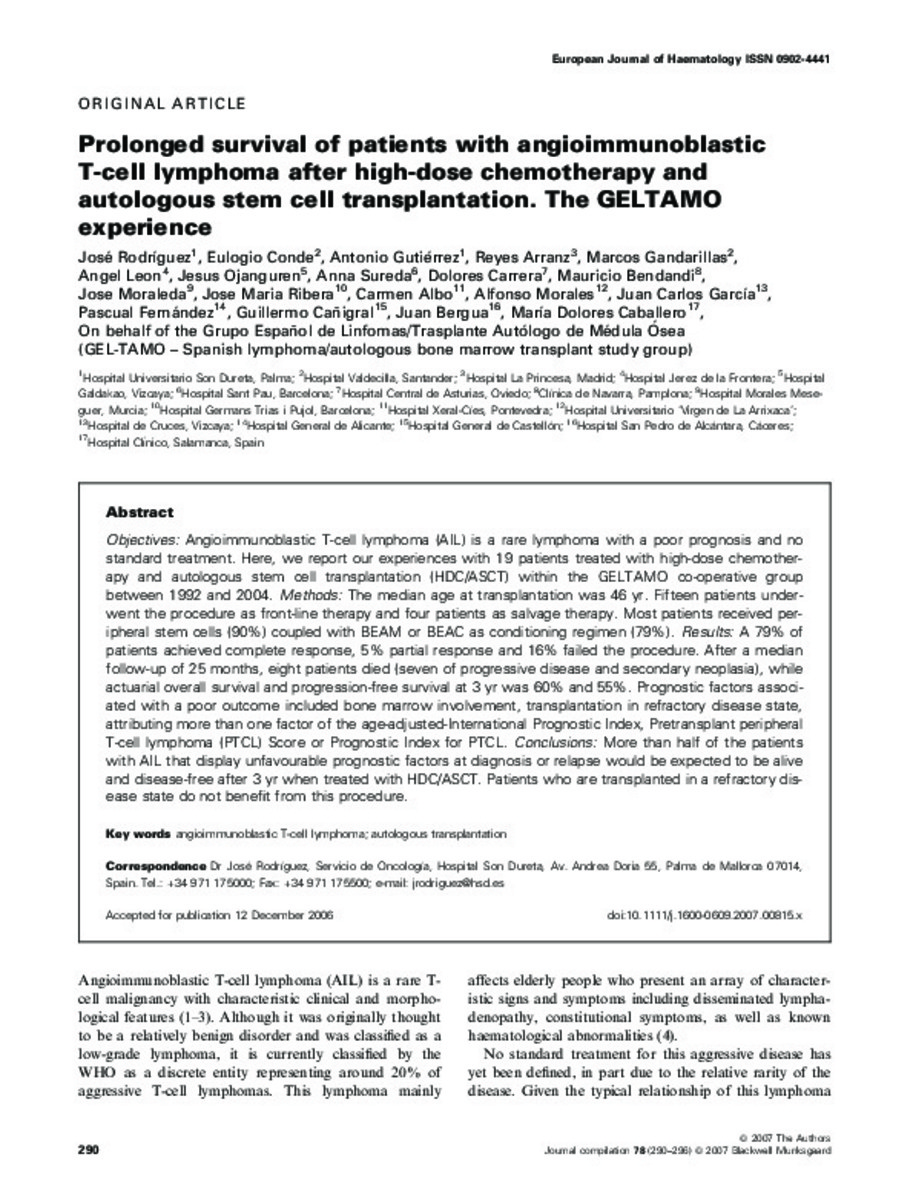Full metadata record
| DC Field | Value | Language |
|---|---|---|
| dc.creator | Rodriguez, J. (José) | - |
| dc.creator | Conde, E. (Eulogio) | - |
| dc.creator | Gutierrez, A. (Antonio) | - |
| dc.creator | Arranz, R. (Reyes) | - |
| dc.creator | Gandarillas, M. (M.) | - |
| dc.creator | Leon, A. (Angel) | - |
| dc.creator | Ojanguren, J. (Jesús) | - |
| dc.creator | Sureda-Balari, A. M. (Anna Maria) | - |
| dc.creator | Carrera, D. (D,) | - |
| dc.creator | Bendandi, M. (Maurizio) | - |
| dc.creator | Moraleda, J. M. (José M.) | - |
| dc.creator | Ribera, J.M. (José María) | - |
| dc.creator | Albo, C. (Carmen) | - |
| dc.creator | Morales, A. (Alfonso) | - |
| dc.creator | Garcia, J. (Juan Carlos) | - |
| dc.creator | Fernandez, P. (Pascual) | - |
| dc.creator | Cañigral, G. (G.) | - |
| dc.creator | Bergua, J. (Juan) | - |
| dc.creator | Caballero, M.D. (M.D.) | - |
| dc.creator | Grupo Español de Linfomas/Trasplante Autólogo de Médula Ósea (GEL-TAMO) | - |
| dc.date.accessioned | 2011-11-30T09:58:19Z | - |
| dc.date.available | 2011-11-30T09:58:19Z | - |
| dc.date.issued | 2007 | - |
| dc.identifier.citation | Rodriguez J, Conde E, Gutierrez A, Arranz R, Gandarillas M, Leon A, et al. Prolonged survival of patients with angioimmunoblastic T-cell lymphoma after high-dose chemotherapy and autologous stem cell transplantation: the GELTAMO experience. Eur J Haematol 2007 Apr;78(4):290-296. | es_ES |
| dc.identifier.issn | 1600-0609 | - |
| dc.identifier.uri | https://hdl.handle.net/10171/20016 | - |
| dc.description.abstract | Abstract OBJECTIVES: Angioimmunoblastic T-cell lymphoma (AIL) is a rare lymphoma with a poor prognosis and no standard treatment. Here, we report our experiences with 19 patients treated with high-dose chemotherapy and autologous stem cell transplantation (HDC/ASCT) within the GELTAMO co-operative group between 1992 and 2004. METHODS: The median age at transplantation was 46 yr. Fifteen patients underwent the procedure as front-line therapy and four patients as salvage therapy. Most patients received peripheral stem cells (90%) coupled with BEAM or BEAC as conditioning regimen (79%). RESULTS: A 79% of patients achieved complete response, 5% partial response and 16% failed the procedure. After a median follow-up of 25 months, eight patients died (seven of progressive disease and secondary neoplasia), while actuarial overall survival and progression-free survival at 3 yr was 60% and 55%. Prognostic factors associated with a poor outcome included bone marrow involvement, transplantation in refractory disease state, attributing more than one factor of the age-adjusted-International Prognostic Index, Pretransplant peripheral T-cell lymphoma (PTCL) Score or Prognostic Index for PTCL. CONCLUSIONS: More than half of the patients with AIL that display unfavourable prognostic factors at diagnosis or relapse would be expected to be alive and disease-free after 3 yr when treated with HDC/ASCT. Patients who are transplanted in a refractory disease state do not benefit from this procedure. | es_ES |
| dc.language.iso | eng | es_ES |
| dc.publisher | John Wiley and Sons | es_ES |
| dc.rights | info:eu-repo/semantics/openAccess | es_ES |
| dc.subject | Angioimmunoblastic T-cell lymphoma | es_ES |
| dc.subject | Autologous transplantation | es_ES |
| dc.title | Prolonged survival of patients with angioimmunoblastic T-cell lymphoma after high-dose chemotherapy and autologous stem cell transplantation: the GELTAMO experience | es_ES |
| dc.type | info:eu-repo/semantics/article | es_ES |
| dc.relation.publisherversion | http://bit.ly/u0j2sE | es_ES |
Files in This Item:
Statistics and impact
Items in Dadun are protected by copyright, with all rights reserved, unless otherwise indicated.






